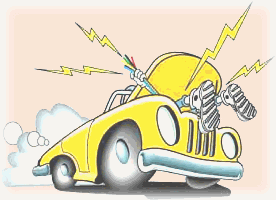|
|
|
|
|
|
|
|
|
|
|
|
|
|
|
|
|
|
|
|
|
|
|
|
|
|
|
|
|
|
The People News, a free newspaper serving Cleveland Tennessee (TN) and Bradley County Tennessee (Tn).
Of Bradley County Tn.
AUGUST 2006
The People News, a free newspaper serving Cleveland and Bradley County Tn.
|
|
|
|
|
|
|
HOME
|
|
BACK ISSUE ARCHIVE
|
|
EDITORIALS
|
|
LETTERS
|
|
CONTACT US
|
|
|
|
|
|
|
|
|
|
|

|
|
|
|

|
|
|
|
|
|
|

|
|
|
|
|
|
|
|
|
|
Car Talk by J. B. Griffin III.
A reader posed an interesting question to me the other day along these lines. "Would it help my car to put Super Unleaded gasoline in my tank even though I have always run Regular in it?" In effect, the question was really, "Wouldn't a tank of Super help clean out the engine and fuel
|
|
|
|
|
|

|
|
|
|
|
|
|
|

|
|
|
|
|
|
|
system?" After all, that's what we are led to believe by many of the
advertisements and gimmicks on the market. The short answer, for those of you in a hurry to skip over to Jerry Key's Sports column is "No." For those of you who want to read through a longer explanation, as well as to have another popular myth exploded, stick around.
The difference between the most expensive High Test gas and Regular Unleaded is the octane rating. The octane rating, contrary to popular marketing misinformation, has absolutely nothing to do with the quality of the fuel. It is simply a measuring stick of how fast the combustion takes place inside your engine's combustion chamber once the fuel and air mixture has been compressed and ignited by the spark plug. It also bears a direct correlation to the temperature required to ignite the
|
|
|
|
|
|
|
|
|
|
|
|
|
|
|
mixture under these conditions. In other words, a lower octane rating permits a lower temperature to ignite the mixture.
Compressing the fuel and air mixture inside the cylinders generates heat. A lot of heat. Naturally, higher compression engines raise the temperature of the mixture a lot more than lower compression engines
|
|
|
|
|
|

|
|
do. Typically, gasoline engines have compression ratios ranging from 8:1 to 10:1 for passenger vehicles to as high as 14:1 for racing engines. That is why you cannot put regular fuel into race cars. Regular fuel would actually begin to ignite itself during compression and cause such severe detonation on the tops of the pistons that the engine would self-destruct. This same thing happens in high performance passenger vehicles to a lesser degree if Regular fuel is substituted for Premium. The popular error is to
|
|
|
|
|
|
|
describe the noise of detonation as "valve rattle," as if the valve clearance adjustment is involved somehow. The noise is simply two flame fronts colliding inside the cylinder. One (the bad one) that is ignited prematurely by compression and one (the good one) that is ignited at the proper time by the spark plug. This problem is cured simply by burning higher octane fuel.
In summary to this question I always give the following advice. As engines age and wear the compression decreases which actually requires a lower octane fuel in order to run properly, but over time a
carbon residue builds up inside the combustion chambers which in effect maintains or even raises the compression ratio. This might be acceptable except for the fact the carbon creates "hot spots" which themselves begin to preignite the fuel. This leads the unsuspecting motorist to believe that a higher octane fuel is the correct solution; however, the real solution is to have an upper cylinder cleaning performed regularly and to burn the correct fuel for which your vehicle was designed. This information is found in your owner's manual.
JB Griffin owns and operates JB's Auto Sales and Service in Evensville, Tennessee. You may see him weekly on the WDEF-TV News 12 Morning Show every Tuesday at 7:10 a.m. where he will answer your car care questions live and on air. Visit him on the web at: www.500overcost.com
.
|
|
|
|
|
|
|
|
HOME
|
|
BACK ISSUE ARCHIVE
|
|
EDITORIALS
|
|
LETTERS
|
|
CONTACT US
|
|
|
|
|
|
|
|
|
|
|

|
|


